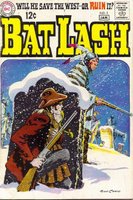
Tomahawk was a long-running DC series featuring the adventures of one Thomas A. Hawk during the Revolutionary War era.
American culture of the 1950s was dominated by the Western. Stars such as Jimmy Stewart and John Wayne rode tall in the saddle for much of the decade. Baseball historian Bill James once speculated that the reason TV shows like the Beverly Hillbillies and Green Acres were so popular in the 1960s is that the "hicks" they featured were a dying breed in America. I suspect much the same can be said of the Westerns in the 1950s; by then the Old West was gone, and we missed it.
The Western was also enormously popular in the comic books of the time. DC published almost 300 comics with a Western theme during the decade, including All-Star Western, Hopalong Cassidy, Dale Evans, and Western Comics. In addition, Western characters appeared in other magazines, including Pow-Wow Smith (in Detective) and the Vigilante (in Action). These comics were so popular that even some of the horses got their own books; the Lone Ranger's Silver had 37 issues, while Roy Rogers' Trigger lasted for 17.
The opening story in this issue is General Tomahawk. Here's the splash:

That's obviously an homage to the famed painting of Washington Crossing the Delaware; according to the GCD the artist is Bob Brown. The premise of the story is stated here:

So General Washington grants Tomahawk a temporary commission in the Army so he can encourage the men to last out the bitter winter conditions. After sneaking past the redcoats, he encounters his men:

Things look pretty bleak indeed. But Tomahawk learns that the British Fort Royal is bulging with supplies and resolves to appropriate them for his men. He and his junior partner, Dan Hunter, get into the fort on New Year's Eve by pretending to be traveling troubadours:

They manage to sabotage the British troops and escape with some supplies. And in order to prevent the British from maintaining their positions hemming in the troops:

Comments: An entertaining and amusing story, and Brown's artwork is nothing short of sensational.
The second story is the one featured on the cover. A renegade band of Indians have planned to cut off America's lifeline to Great Britain by capturing a lighthouse, and turning out the light, leaving the British fleet to crash on the rocks. Tomahawk attempts to alert the governor:

Tomahawk persuades the captain of a whaling vessel to take to sea to try to stop the raid on the lighthouse, but they are too late. In order to save the British fleet, they set fire to the whaler, alerting the English ships to the danger of the nearby shoals. Then Tomahawk and his men strand the Indians on the lighthouse island by harpooning their canoes as shown on the cover.
Note: This story appears to take place prior to the Revolution, as Tomahawk and the British cooperate against the Indians.
Comments: A fairly pedestrian story lent some luster by Fred Ray's strong artwork.
In the third story, a traveling zoo is attacked by a band of Cherokee Indians, and the animals (including a panther, a lion, a water buffalo and a rhino) are released into the wilds of America. Tomahawk and Dan help the zoo-keeper recover the animals and defeat the Cherokee.

Comments: Solid entertainment.
Overall the artwork and stories were very good, but some of the details are a little shaky geographically. For example, in the second story, Tomahawk's renegade Indians are supposedly from the Chinook tribe, which was located in the Pacific Northwest, nowhere near Boston. And how far afield were the Cherokee, given that the other stories in this issue take place in New York/New England?
The later Tomahawk series (after Jack Schiff took over) was more the monster of the month club, but this issue shows that the earlier issues provided some excellent entertainment value.






3 comments:
The Silver Age wasn't entirely about super-heroes, and it's nice to read your reviews of lesser-known titles like TOMAHAWK.
The great thing about the Silver Age was that comics covered all the genres. Like movies or television, comics had westerns, scifi, crime, war, romance, comedy, cartoons...pretty darned savoury.
Whether you want it or not, you've won the Kreativ Blogger Award! Congrats! See my 2/1/10 post!
Post a Comment